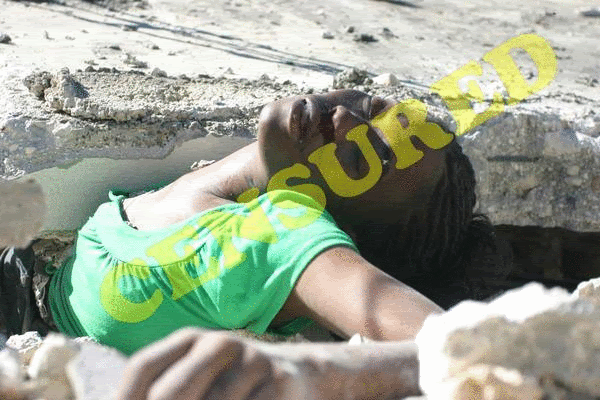 “Bush Was Responsible for Destroying Haitian Democracy”–Randall Robinson on Obama Tapping Bush to Co-Chair US Relief Efforts Randall-robinson
“Bush Was Responsible for Destroying Haitian Democracy”–Randall Robinson on Obama Tapping Bush to Co-Chair US Relief Efforts Randall-robinsonWe speak with TransAfrica founder Randall Robinson, author of An Unbroken Agony: Haiti, from Revolution to the Kidnapping of a President. On President Obama tapping former President Bill Clinton and former President George W Bush to co-chair US relief efforts in Haiti, Robinson says, “Bush was responsible for destroying Haitian democracy…Clinton has largely sponsored a program of economic development that supports the idea of sweatshops… but that is not what we should focus on now. We should focus on saving lives.” [includes rush transcript]
[Video: ]
AMY GOODMAN: We have now with us on the line Ali Lutz, who is the Haiti program coordinator for the group Partners in Health that has clinics throughout Haiti.
Ali, talk about the situation of aid.
ALI LUTZ: Good morning, Amy. Thank you.
The situation in Haiti is obviously extremely dire. And we are trying to get supplies and medical personnel into Port-au-Prince and to the clinics that Partners in Health helps run throughout the country to support the response, because obviously our colleagues in Haiti, our doctors, nurses, surgeons, they’re dealing with their own families during this tragedy and doing the best that they can also to help the victims.
JUAN GONZALEZ: And Ali, in your contacts to get aid in, who, as far as you can tell right now, is in charge in Haiti? I know the US military now is in charge of the airport. But who do go to to try to get permission to bring your materials in?
AMY GOODMAN: Ali, are you there?
JUAN GONZALEZ: I think we’ve lost her there.
AMY GOODMAN: The problems with Skype here. Well, we’ll go back to Ali Lutz after this conversation.
But just before the program, I spoke with Randall Robinson. He’s the founder and past president of TransAfrica. He’s currently a visiting law professor at Pennsylvania State University, though he goes home to Saint Kitts tomorrow, where he lives. His most recent book is An Unbroken Agony: Haiti, from Revolution to the Kidnapping of a President. I began by just asking for his thoughts about the crisis right now in Haiti.
RANDALL ROBINSON: It’s important, in trying to find ways to help, to be generous and to give, and to give generously. I would like to commend President Obama for his strong and fast response of a commitment of $100 million. Operations are already underway. I think the world is being incredibly generous, as I understand the pace of things to be at this point, the pace of giving. But, of course, as many lives as can possibly be salvaged need to be salvaged as quickly as possible, and I have every reason to believe that the administration and others are doing the very best that they can. As a private citizen, it’s my responsibility, and our general responsibility, to support every effort that’s being made to save lives in Haiti.
AMY GOODMAN: Word is now President Préval has said they’ve just burned—buried 7,000 bodies in a mass grave, but the most important thing right now is the search equipment, to go in and to save people who are just hanging on, perhaps who have been crushed, who are hidden in the rubble. And yet, that has yet to come. Some word is there’s a lot of aid at the airport not able to get through, and then other aid just hasn’t come.
RANDALL ROBINSON: Well, that’s not surprising. It’s hard for things to function when virtually all of the infrastructure has been destroyed. The Haitian government is unable to function, I would imagine, because it’s under the same burden that all Haitians are under. The President’s home has been destroyed. It’s hard to get from point A to point B, because the roads are blocked, petrol is not available. Heavy equipment is not yet available.
But in the spirit of konbit, the Haitian Creole word for “collaboration and cooperation,” Haitians are doing everything they can. They are resilient, industrious, courageous people. They’re doing everything they can to save the lives of their fellows, and they’re doing it, thus far, with very little, because it’s taking a while for that kind of assistance to materialize.
AMY GOODMAN: President Obama has tapped President Clinton and former President George W. Bush to coordinate the aid relief to Haiti. I was wondering your thoughts on that.
RANDALL ROBINSON: Well, Amy, I’m, of course, troubled by that. I don’t think this is the time—neither the time nor the place to discuss those things that have troubled me for a long time in the history of American policy towards Haiti. Now the focus must be upon the rescue efforts that are underway to save lives.
But I hope that this experience, this disaster, causes American media to take a keener look at Haiti, at the Haitian people, at their wonderful creativity, at their art, at their culture, and what they’ve had to bear. It has been described to the American people as a problem of their own making. Well, that’s simply not the case. Haiti has been, of course, put upon by outside powers for its whole post-slavery history, from 1804 up until the present.
Of course, President Bush was responsible for destroying Haitian democracy in 2004, when he and American forces abducted President Aristide and his wife, taking them off to Africa, and they are now in South Africa. President Clinton has largely sponsored a program of economic development that supports the idea of sweatshops. Haitians in Haiti today make 38 cents an hour. They don’t make a high enough wage to pay for their lunch and transportation to and from work. But this is the kind of economic program that President Clinton has supported. I think that is sad, that these two should be joined in this kind of effort. It sends, I think, the wrong kind of signal. But that is not what we should focus on now. We should focus on saving lives.
But in the last analysis, I hope that American media will not just continue to—the refrain of Haiti being the poorest country in the western hemisphere, but will come to ask the question, why? What distinguishes Haiti from the rest of the Caribbean? Why are the other countries, like the country in which I live, Saint Kitts, middle-income and successful countries, and Haiti is mired in economic despair? What happened? And who’s had a hand in it? If Haiti has been under a series of serial dictatorship, who armed the dictators? There are other hands in Haiti’s problem. Of course Haiti is responsible for some of its own failures, but probably not principally responsible. We need to know that. We need to be told the whole story of these wonderful, resilient, courageous and industrious people. And we have not been told that. I would hope that this would be an opportunity for doing so.
AMY GOODMAN: In talking about President Bush, while most people may not know the role the US played in the ouster of President Aristide February 29th, 2004, probably what would come to mind when there’s any discussion of relief efforts is Katrina.
RANDALL ROBINSON: Yes. The problem of what happened in February 2004 continues. We had democracy in Haiti, and that democracy was blighted by the Bush administration. And now President Aristide’s party is prohibited from participating in the electoral process. His party is the largest party in Haiti. And why should we be so afraid to let his party participate? If Haitian people don’t want them, they won’t vote for them. That is the very essence of democracy, that people get a chance to stand for election, and the electorate gets a chance to make a decision. But we have obstructed that process in Haiti. We have done that under the Clinton administration, under the Bush administration, and that continues under the Obama administration. And that is indeed unfortunate. I am imploring American media to examine this in whole part, in ways that media have failed to do so up until now.
AMY GOODMAN: This history, the two crises, the natural catastrophe that is the earthquake, that the Red Cross is now saying they believe perhaps up to 50,000 people have died—and we’re not talking about, you know, just what has happened in the past, but what is currently happening. Who was just quoted? Lieutenant General Russel Honoré, the retired general who took charge of relief efforts in New Orleans, said that aid should have arrived, that said the US military should have arrived in earthquake-devastated Haiti twenty-four hours earlier. Of course, as we know, people trapped under rubble, every minute counts.
RANDALL ROBINSON: Well, I’m not in a position to comment on that. I simply can’t make an assessment of how fast or how slowly they arrived or how soon they should have arrived. And so, I will withhold comment on that.
AMY GOODMAN: Does it make you nervous to hear about US soldiers on Haitian soil? If you can share a little more of the history of the United States and Haiti—or do you think this isn’t the time to talk, for example, about 1915 to 1934, the first US Marine occupation, and then—
RANDALL ROBINSON: Well, I should think it would—I should think, Amy, it would make Haitians nervous under these circumstances. Of course, I’m sure that they are, understandably, quite happy to see assistance from any quarter.
But it was in 1915 that Woodrow Wilson, of course, with a force of American Marines, invaded and occupied Haiti until 1934. They seized land, redistributed it to American corporations, took control of the country, ran the country, collected customs duties for that period of time, and ran the country as if it were an American possession.
But this has marked the relationship since Toussaint Louverture and an army of ex-slaves overthrew French rule in 1804. The French exacted, of course, reparations from the new free black republic of Haiti, bankrupting the country. The Vatican didn’t recognize Haiti until the 1860s. The Western nations of the world, responding to a call for isolation and embargo from Thomas Jefferson, imposed sanctions on Haiti that lasted until the Emancipation Proclamation in the United States, of course followed in the twentieth century by President Wilson’s occupation and then by the dictatorial blight of Duvaliers, Papa and son, and all of the other military generals that, of course, were armed by the United States.
And so, Haiti’s plight up until this point has been, in some significant way, attributable to bad and painful American, French and Western policy that some believe is caused or described, motivated by Toussaint Louverture’s victory over Napoleon. The French have never forgiven the Haitian people for this.
AMY GOODMAN: Former President Jean-Bertrand Aristide said he’s ready to return to help rebuild his country in the wake of the devastating earthquake. Why can’t he just return?
RANDALL ROBINSON: Well, the—I’m not sure what the stated American policy is, but of course the Bush administration policy was to forbid his return. But any obstruction of his return by any power would constitute a violation of international law, a violation of the UN Charter, a violation of the Universal Declaration of Human Rights, a violation of any number of major UN human rights conventions. You cannot restrict people either from leaving their country—citizens, either from leaving their country or returning to their country. He has every right to return home, should he want to. And one would hope that no administration, the American administration nor any other, would stand in the way of his passage home.
AMY GOODMAN: A few nights ago, Naomi Klein was in New York, author of The Shock Doctrine: The Rise of Disaster Capitalism, and she quoted a Heritage Foundation press release that came out very soon after the earthquake, talking about this being an opportunity. That is the question, whether it is an opportunity, she said, of the corporate vultures hovering over Haiti, waiting to descend and restructure Haiti, or an opportunity for progressive Haitians to rebuild their own country, to rebuild Haiti. What are your thoughts about this?
RANDALL ROBINSON: Well, it’s an opportunity, I think, for the American people to, at long last, learn the full truth about Haiti and about our relationship with Haiti. They’ve known—they’ve been caused to know very little about it. And I think progress—a new beginning starts with the truth. That is a truth that has been suppressed for all of these many years. The American people know almost nothing about what happened in 2004, about the abduction of President Aristide, about the destruction of Haiti’s democracy as a result of the efforts of both the United States and the French government. We need to know that.
And in the last analysis, Haitians have at their disposal a vigorous, creative, industrious and successful community in the United States, in France, in Canada. The Haitian diaspora is very much engaged with Haiti. They need to be given an opportunity to help Haiti rebuild itself.
We need to go away from what we’ve been doing in support, a sort of an unconditional support, for wealthy Haitians that are running sweatshops in the country, that pay people appallingly low wages. That is not the way to any bright future for Haiti. And that is the—of course, the idea that former President Clinton has been advancing for Haiti. I think it is sad. It can’t work. It won’t work. It will brew a further resentment of the United States.
And I think that the only way we can move ahead constructively with Haiti is to begin by telling the full story of our relationship with Haiti since 1804, what happened in the nineteenth century and what has happened in the twentieth century, so that Americans will understand at long last that Haiti’s misery is largely not of its own making. They will learn of a Haitian people who are quite different from those who have been described to them. And I think it is at that point we can make the beginning that we need to make and that is rooted in a policy that is constructive and sensitive and caring and productive for the United States, as well as for the Haitian people.
AMY GOODMAN: Randall Robinson, founder and past president of TransAfrica. He fasted almost until death years ago under the Clinton administration to try to get President Clinton to close Guantanamo. In that case, it was to close Guantanamo so that Haitian refugees who were trying to escape the coup in Haiti were able to come into the United States. Randall Robinson’s latest book is called An Unbroken Agony: Haiti, from Revolution to the Kidnapping of a President.
 [ Aus "Le Negropolitain". Wurde nach unserer Protestation entfernt. Eine Entschuldigung wurde ausgesprochen. ]
[ Aus "Le Negropolitain". Wurde nach unserer Protestation entfernt. Eine Entschuldigung wurde ausgesprochen. ] [ Aus (From) "San Francisco BAY VIEW: National Black Newspaper". Dieses selbsternannte Conscious Black Media ist offentsichlich nicht in der Lage die Problematik zu verstehen. Auch nach unserem Protestschreiben wurden etliche Bilder nicht entfernt... Was wir früher nur mit den eurozentristisch-rassifizierten Medien in Verbindung brachten(eine lange Traditoin aus der Kolonialzeit: Schwarz muss mit ELEND, ARMUT, KRANKHEIT, TOD, FAULHEIT, WILDHEIT, SPAß, etc. stets in Verbindung gebracht werden.), scheinen heute auch eine Spezialität lobotomierter Schwarzer/Afrikanischer Medien zu sein. ]
[ Aus (From) "San Francisco BAY VIEW: National Black Newspaper". Dieses selbsternannte Conscious Black Media ist offentsichlich nicht in der Lage die Problematik zu verstehen. Auch nach unserem Protestschreiben wurden etliche Bilder nicht entfernt... Was wir früher nur mit den eurozentristisch-rassifizierten Medien in Verbindung brachten(eine lange Traditoin aus der Kolonialzeit: Schwarz muss mit ELEND, ARMUT, KRANKHEIT, TOD, FAULHEIT, WILDHEIT, SPAß, etc. stets in Verbindung gebracht werden.), scheinen heute auch eine Spezialität lobotomierter Schwarzer/Afrikanischer Medien zu sein. ] [ Dieses Bild gehört zu den ersten Bildern, die westliche Medien nach dem Erdbeben in Haiti verbreiteten. Wir hatten jedoch nicht mal ein einziges Bild der Opfer des WORLD TRADE CENTER nach seinem Sturz am 11. Sept. 2001 gesehen...]
[ Dieses Bild gehört zu den ersten Bildern, die westliche Medien nach dem Erdbeben in Haiti verbreiteten. Wir hatten jedoch nicht mal ein einziges Bild der Opfer des WORLD TRADE CENTER nach seinem Sturz am 11. Sept. 2001 gesehen...] [ Aus(From) "San Francisco BAY VIEW: National Black Newspaper" ]
[ Aus(From) "San Francisco BAY VIEW: National Black Newspaper" ]![BOIS-CAIMAN-1791-CLUB [the african memory]](https://blogger.googleusercontent.com/img/b/R29vZ2xl/AVvXsEjthfqy-hYzHw7sv58_RVCAameV_WrAgeWBzAhb5XeeFpM9EQegROHsrbJriUiTEbev2AudKEXMVqS4mZLgE3bgcQ6mNUNWzvXUhyphenhyphen-ugR-pL7ymfmq4WxS1dfBAtcPJFANmmtZZrVlYeFgx/s1600/BannerBEST-aktuell----.gif)














![NAKO MITUNAKA _ by Kiamuangana Mateta [BOIS-CAIMAN-RadioTV]](https://blogger.googleusercontent.com/img/b/R29vZ2xl/AVvXsEgnJY7ZdSLgOYpHI1adfGmnE-IZAKIK8XzKghU4jsqIzVh8Rb4i_-IQnikM4qXXz0qG1texdoCPvIM2AXT7_5CieLvbYBit8XERz1gHcLhX-PvZ4TYnJ2wZk2Fbxwc5xzddMmmhIYPsqfI/s400/Homme_Noir.jpg)

















![White Supremacy and Martin Luther King - We Remember Dr. KING -January, 15.[ 1929-1968]](https://blogger.googleusercontent.com/img/b/R29vZ2xl/AVvXsEinoT6GOgBwPmFJIcZsaSh5cfVjMJ4WuAlOZAbvgKKMlSiE1NmHw5ICBouiIpumE0Edh4BByPH3UtlXD8BQQMbgfpOzGCzkFXTgmd6cr2XbQe54jvKx_Ds9tNnnqlvXPAKBCTzfl4zlR-A/s400/KING2.jpg)
































